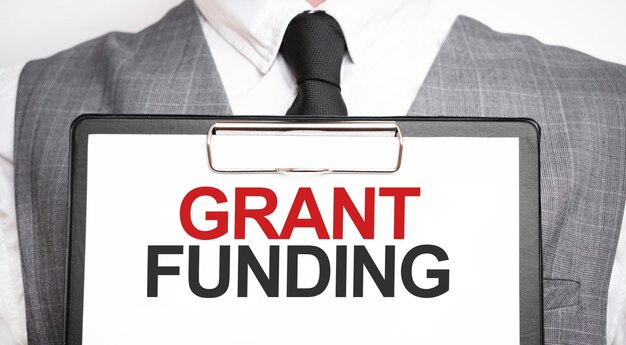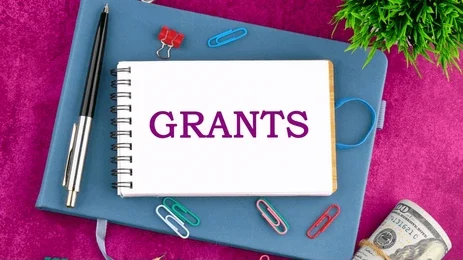If you’re seeking to access significant funds for your business, you have to learn to apply for a business grant. Getting a business grant can be a game-changer for entrepreneurs. It provides the necessary financial boost to fuel growth, innovation, and expansion. To get a business grant, you’ll have to learn how to write a rant proposal for your business.
The process of applying for and writing a compelling grant proposal for your business can be daunting. In this article, we have provided you with a comprehensive guide that’ll help you write a compelling business grant in 2025.
Key Takeaway
- A business grant is awarded to businesses that have projects that align with the grant giver’s criteria
- Have a strong enough reason for applying before going for any business grant
- Your chances of success increase when you tailor your grant proposal to the type of grant you’re applying for.
Table of Contents
What is a Business Grant?
A business grant is an award, usually financial, given by an entity to a company to facilitate a goal or incentivize performance.
It is a type of financial aid awarded to businesses, typically for specific purposes such as research, development, or community outreach. Unlike loans, business grants don’t need to be repaid. They’re often provided by government agencies, foundations, or non-profit organizations.

What Are The Types of Business Grants Available?
before making any move to apply for a business grant, you need to understand the various types available. Business grants may differ from country to country, but there are basic types you can find anywhere in the world. Business grants are specifically given to businesses that meet certain criteria determined by the grant giver.
Generally, here are the types of grants available;
1. Government Grants
These grants are offered by federal, state, and local governments. They often focus on specific industries, regions, or business goals. In a bid to help businesses thrive and in turn grow the economy, the government provides grants to qualified businesses. These rants may be industry-based or region-based.
2. Foundation Grants
Foundations are non-profit organizations that distribute funds for various purposes, including business grants. Their grants can be more flexible and tailored to specific projects. Some individuals set up foundations that come in as either angel investors or distributors of business grants
3. Corporate Grants
Some corporations offer grants to support businesses, particularly those aligned with their corporate social responsibility goals. These corporate organizations assess the businesses that apply for the grants they offer to determine which ones are deserving.
If you learn to write a business grant the proper way following the tips shared in this article, you’ll stand a better chance at success.
How Can I Apply For A Business Grant in 2025?
To apply for a business grant in 2024 successfully, you have to learn how to write a grant proposal. Writing a great grant proposal for a business is vital for getting new funding. The question is, where do you begin especially if you haven’t done this before? This comprehensive guide will show you exactly how to write and win business grants in 2024.

1. Know Your Why
There has to be a clear purpose for applying for a grant, it is the most important thing to do before you get too far into the application process. As you plan to apply for a business grant, you must understand clearly your reason. Many business owners make the mistake of looking for grants just to get a cash injection and run their businesses as usual without a real project that requires funding.
Unfortunately, grants are awarded to fund projects that align with the grantmaker’s objectives, and before you get too far into looking for grants, you need a project worth funding.
Grantmakers like the MacArthur Foundation in Nigeria want to support projects with a clear purpose and demonstrable potential for impact in the areas they operate. Before you apply for a business grant, honestly evaluate your proposition thus;
- Identify the specific problem your project is solving
- Evaluate your approach, find out its uniqueness, and ascertain whether it is innovative
- Outline the potential outcomes as well as benefits to your target community.
- Find evidence of community support or collaboration. Your project has to be supported by others, this shows proof of acceptance.
2. Identify Suitable Grants
The next step is to identify grants that align with your business goals and mission. You have to carefully research so that you know whether or not to apply for a business grant There are lots of grants out there for different types of businesses, so go for those that are best suited for your business. This increases your chances of success.
Here’s how to do it:
- Research: Carefully explore online databases, government websites, and industry-specific organizations for grants that match your business needs. In Nigeria, you can check out TEF grants.
Successful grant writers are thorough with research. You should do a deep dive into the background, priorities, and past recipients of the grant you are applying for. Successful applications will always leave clues that will help your business grant proposal.
- Consider Eligibility: Ensure your business meets the specific requirements, such as industry, location, and revenue. You can check your business eligibility here. Some business grants come with specified amounts and eligibility criteria, it is your duty to ensure that your business meets the criteria for any grant you apply for
- Understand Priorities: Pay attention to the grantor’s focus areas. Grant proposals that address their priorities are more likely to be funded. For example, some foundations may prioritize grants for environmental sustainability or education.
3. Craft a Strong Proposal
This is crucial when you want to apply for a business grant. Once you’ve identified suitable grants, the next step is to craft a compelling proposal. Crafting a compelling proposal takes strategic steps which have been listed below. You’ll need to be thorough at every phase.
Always keep in mind that there may be hundreds of other businesses gunning for the same grant as you. Whatever you do, you have to stand out. When you set out to apply for a business grant, you must consider it serious business.
When crafting a strong and compelling proposal, here’s what to include:
- Executive Summary: This is a brief overview of your business, the problem you’re solving, the proposed solution, and the requested funding. It should be concise and engaging.
- Problem Statement: Your problem statement is crucial in your application, you should handle it meticulously. Clearly define the problem your business addresses and its impact. Use data and evidence to support your claims.
Your problem statement could be the deciding factor whether or not you get the grant you seek. You must ensure you are solving a real problem and that this section of your grant is carefully articulated.
- Proposed Solution: Here’s where you lay out that beautiful solution you have. Detail how your business will solve the problem and create value. Explain the unique aspects of your approach and how it differs from competitors. Do this with every ounce of carefulness, paying attention to every detail.
Your proposed solution could become your unique selling point (USP), you have to do it right.
- Budget: Create a detailed budget that accurately reflects the costs of your project. Include a breakdown of expenses, such as salaries, equipment, and materials. This budget must not be more than the sum to be awarded by the grant. It should also not be ridiculously low. Rather, plan with the grant amount.
The grantmaker would want to know how you plan to utilize the grant if given.
- Impact Assessment: Explain how the grant will benefit your business, your community, and the industry. Quantify the expected outcomes and use metrics to measure success. Do not joke with data and the right metrics. Numbers and the right projections could just be the game-changers for you
- Timeline: Every project must have a timeline. Provide a clear timeline for implementation and expected outcomes. This will demonstrate your ability to manage the project effectively.
- Letters of Support: Include letters of support from stakeholders, such as customers, partners, or community leaders. These can strengthen your proposal and provide credibility.
4. Tailor Your Proposal
You need to recognize that every grant is unique in its own way. So when you apply for a business grant, ensure to tailor your proposal to each specific application. There is no one-size-fits-all when it comes to business grant writing.
Here are some tips to tailor your proposal to any grant you apply for:
- Customize Your Proposal: Every time you apply for a business grant, make sure to adapt your proposal to the specific requirements and priorities of the grant you are applying for. Highlight the alignment between your business and what the grantor seeks to achieve.
- Highlight Your Unique Value: What you need to do at this point is to emphasize what sets your business apart and why you deserve the grant. Apply for a business grant with a focus on your competitive advantage and the unique benefits your solution offers. This gives you an edge.
- Address Potential Challenges: A good business owner anticipates challenges and prepares for them. When you apply for a business grant, show that you anticipate potential obstacles to achieving your project goals and highlight how you plan to address them. This demonstrates your preparedness and ability to overcome challenges.
5. Proofread and Edit
This phase is crucial and shouldn’t be skipped. Never be in a hurry to turn in your grant proposal without a proper edit and proofreading. It is best to get a professional to handle this phase of your proposal. It is one thing to apply for a business grant, it is another for that proposal to be properly done.
You can not afford to go wrong at this phase, not when you’re almost over the finish line.
Here are some things to look out for when editing and proofreading;
- Accuracy: Ensure all information is accurate, consistent, and free of errors.
- Clarity: Write in a clear, concise, and engaging style. Avoid jargon or technical terms that may be unfamiliar to the reviewers.
- Professionalism: Present a professional and polished appearance. Use high-quality formatting and avoid typos or grammatical errors.
6. Submit on Time
Whatever you do, please be time conscious. You might apply for a business grant the best way you know how to, but if you miss the deadline, your efforts will be in vain. Here are things you must take into consideration when you apply for a business grant;
- Deadlines: Strictly adhere to the submission deadlines. Late submissions will typically not be considered.
- Follow Instructions: Carefully follow the grantor’s guidelines and requirements. This includes formatting, submission methods, and any additional documents that may be required.
Also read – How to Secure Start Up Business Grants in Nigeria 2024
Conclusion
Securing a business grant in 2025 will give you the boost you need to accelerate your business processes.
While several businesses are competing for the limited grants available, following the tips shared in this article will give you a competitive advantage. Do not forget to tailor your grant proposal to the type of grant you’re applying for.
Frequently Asked Questions
1. What is a business grant?
A business grant is a type of financial aid awarded to businesses for specific purposes. These purposes include research, development, or community outreach. Grants are not like loans, they do not need to be repaid.
What are the eligibility criteria for business grants?
Eligibility criteria vary depending on the grantor and the specific grant program. However, common requirements include business type, size, location, and project goals.
How can I increase my chances of getting a grant?
Building relationships with potential grantors, networking with other grant seekers, and following up after submitting your application can increase your chances of success.





